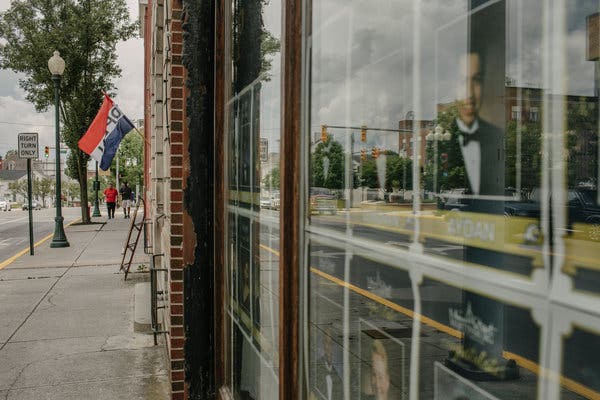WASHINGTON — Long before the death of George Floyd set off a nationwide uproar over police brutality, before protests erupted in 2014 over the death of Michael Brown in Ferguson, Mo., a 50-year-old man named Wayne Jones took a night stroll through the streets of Martinsburg, W.Va.
A police officer saw Mr. Jones walking illegally in the road that night in 2013 and asked whether he was carrying a weapon. Mr. Jones, who had a small knife, and the police got into a tussle, after which one officer accused Mr. Jones of stabbing him. Fifteen minutes later, Mr. Jones lay on the ground facedown between a stone wall and five officers, who had fired 22 bullets at his backside.
Mr. Jones’s brothers, Robert and Bruce, have tried for years to hold the police accountable for Wayne’s death but have repeatedly run into hurdles: Most recently, the officers claimed they could not be held liable under so-called qualified immunity, an esoteric legal doctrine invoked by police departments across the country for decades in response to allegations of excessive force. It provides legal protections for officers when they are accused of violating others’ constitutional rights.
Once a little-known rule, qualified immunity has emerged as a flash point in the protests spurred by Mr. Floyd’s killing and galvanized calls for police reform. In the vast majority of cases of police brutality, officers are never criminally prosecuted. For families of victims seeking some sort of relief through the justice system, qualified immunity presents another obstacle to obtaining financial or other damages. Even in the rare cases where the officers are charged, as in Mr. Floyd’s death, the police can still claim qualified immunity if relatives or victims sue them.
“Every time across the country that I hear of a new case, I see a news report of another victim, it just opens up the wounds again,” Robert Jones said. “It makes it feel like it just happened yesterday.”
Activists have seized on qualified immunity as what they see as one of the biggest problems with policing and argued that it shields officers from being held accountable in cases of misconduct. Police leaders said it was essential for officers’ ability to respond to calls and to make split-second decisions.
Qualified immunity is a focal point of the new debate on Capitol Hill over how to address systemic racism in policing and use of excessive force. House Democrats unveiled a bill that would allow victims of police brutality to seek damages from their assailants. A competing Senate Republican bill made no mention of qualified immunity, and the White House press secretary, Kayleigh McEnany, called it a “total and complete nonstarter.”
State legislatures have taken up the issue as well. The Colorado General Assembly became the first to eliminate qualified immunity this month.
“It’s a message that’s sent in these cases — that officers can violate people’s rights with impunity,” said Joanna Schwartz, a professor of law at the University of California, Los Angeles, who has written extensively on the doctrine. “That is outrageous to people and causing people to act.”
In 1967, amid another era marked by civil rights protests, the Supreme Court introduced qualified immunity to protect government officials acting in good faith — not just police officers — from financial liability. In a case involving clergy members who said they were wrongfully arrested on charges of breach of peace for entering a whites-only bus terminal waiting room, the justices argued that if officers were personally held responsible for their misconduct, it might deter them from performing their duties and making arrests.
The court expanded the protection in ensuing decades, and it now covers “all but the plainly incompetent or those who knowingly violate the law,” a rationale offered by the Supreme Court in 1986 in an unlawful arrest case.
As a result, victims and families accusing police officers of brutality must find a virtually identical case where officers were held responsible to cite as precedent in cases where officers claim qualified immunity.
Since Mr. Brown’s shooting death by a white officer in 2014 and protests over it prompted a national conversation about racism and police brutality, both liberal and conservative justices have expressed doubts about the doctrine. Justice Sonia Sotomayor wrote in 2018 that the doctrine “tells officers that they can shoot first and think later, and it tells the public that palpably unreasonable conduct will go unpunished.”
When the Supreme Court declined last week to take up several cases concerning qualified immunity, Justice Clarence Thomas, the lone dissenting voice, expressed “strong doubts” about the doctrine.
Critics have accused the court of arbitrarily contriving it. At a House Judiciary Committee hearing last week, Representative Jerrold R. Nadler, Democrat of New York and the committee chairman, said that before qualified immunity was “invented” by the Supreme Court, “the world did not fall in.”
David Cole, the national legal director of the American Civil Liberties Union, which filed one of the petitions rejected by the Supreme Court last week, called the doctrine “a free pass” for police officers “to violate constitutional rights without being held to account.”
Though the doctrine is intended to protect officers from paying for the damages they cause, he said the result is that officers are more likely to abuse their powers. “Fiscal concerns are overriding concerns about justice and police accountability,” Mr. Cole added.
Advocates on behalf of the police insisted that qualified immunity was necessary for officers to protect the public. Its protections allow officers to make life-or-death decisions in a matter of seconds, they said, and without it, fewer people might be willing to join police forces.
Bill Johnson, the executive director of the National Association of Police Organizations, said critics of qualified immunity were seizing on the moment to attack a doctrine that had little to do with the widely condemned deaths of Mr. Floyd and Rayshard Brooks, who was shot to death this month by the police in a Wendy’s parking lot in Atlanta, and unfairly targeting the police.
The doctrine does not apply in criminal cases like those pending against the officers involved in the death of Mr. Floyd. Derek Chauvin, a Minneapolis police officer, was recorded on video pinning Mr. Floyd to the ground for nearly nine minutes as Mr. Floyd protested that he could not breathe. Mr. Chauvin was charged with second-degree murder, and the other three officers involved were charged with aiding and abetting in Mr. Floyd’s death. None has entered a plea in court.
“The proponents looking at qualified immunity are kind of cynically taking advantage of a horrific situation to change the law in a different area that does not apply to that area at all,” Mr. Johnson said.
But the charges in the deaths of Mr. Floyd and Mr. Brooks are anomalies. According to Mapping Police Violence, a group that collects data on police shootings, of the 1,147 people killed by the police in 2017, officers were charged with a crime in 13 of the cases, or about 1 percent.
In the vast majority of cases where officers are not charged, victims can pursue justice only in the form of financial or other damages through lawsuits. Qualified immunity can block them from obtaining relief.
Republicans in Congress have rejected any change to the broad protection afforded to police officers. Senator Tim Scott, Republican of South Carolina, who sponsored his party’s bill, called Democrats’ effort to eliminate qualified immunity a “poison pill.” Republicans’ policing bill would create incentives for departments to use body cameras and ban chokeholds as well as create a system to track misconduct.
Senator Lindsey Graham, Republican of South Carolina and the chairman of the Senate Judiciary Committee, did signal an openness to revisiting the doctrine at a committee meeting last week. “Maybe there’s something we can do with the concept of qualified immunity that would put more accountability into the agencies that run police departments,” he suggested.
Another Republican senator, Mike Braun of Indiana, told reporters last week that he would introduce legislation this week to change how qualified immunity was applied.
Wayne Jones’s family won a small victory this month when the federal Fourth Circuit Court of Appeals ruled that the officers involved in his killing could not claim qualified immunity. Noting that the F.B.I. had just begun investigating Mr. Floyd’s killing, the court wrote, “This has to stop.”
Mr. Jones’s relatives are awaiting a decision from the West Virginia Supreme Court about whether they are entitled to see secret testimony given to the grand jury that voted not to indict the officers and whether they are entitled to a new grand jury altogether to investigate the case anew.
Seven years later, Quakers and other groups in the area host monthly vigils for Mr. Jones. And for his brother Robert, the feeling of loss is still fresh. He never watched the footage of his brother’s killing in full, but he mustered up the courage to watch the final minutes of Mr. Floyd’s life. It brought him to tears, and he said that protections for officers, like qualified immunity, are to blame in the deaths.
“It’s like a thief,” he said. “If you keep letting the thief get away with it, he’s going to keep on doing it. If you keep letting these people kill and harass and hurt people, they’re going to keep on doing it.”



















